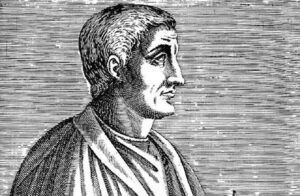
Peter Stothard writes a biography of Horace through his odes
My introduction to the Roman poet Horace happened in Latin II class in high school. As a foreign language elective, Latin was down to two classes — introductory Latin I and Latin II. As I recall, the class did a group translation in class, which likely meant the Latin teacher did most of the heavy lifting. And then in college, in a class on Western civilization, we read a few of Homer’s odes.
Other than that, I’ll confess to a general ignorance of the poet’s body of work.

Quintus Horatius Flaccus
Quintus Horatius Flaccus (65-8 B.C.), better known to us as Horace, lived through one of the most tumultuous periods of Western history. The son of an ex-slave, he came of age during the rapid decline of the Roman Republic, the assassination of Julius Caesar, the civil wars that followed as competing factions battled (literally) for power, and the final triumph by Octavian, soon called Augustus Caesar.
When death from warfare, suicide, forced suicide, and murder was all too common, Horace was able to thread his way through the politics of power in Roman society. And he did something that few of peers accomplished — he died in his bed from natural causes. That by itself was an achievement, given the deadly nature of Roman politics, especially in the upper tier of society.
British journalist and author Peter Stothard tells Horace’s story in Horace: Poet on a Volcano. But he does so in an intriguing way; he uses Horace’s famed odes as the biographical reference. It’s an engaging way to write a biography. Given Horace’s stature as perhaps the leading lyrical poet of his day, celebrated by common man and Caesar alike, it’s also a natural way to write the story of this man’s life.
And what a life he led.
Following the assassination of Julius Caesar, Horace threw his lot in with the rebels and the rebel army led by Brutus and Pompey. After their defeat in Greece, he quietly made his way back to Rome and kept his head down. He eventually caught the eye of Gaius Maecenas, five years older and a poet, diplomat, and counselor to Augustus. Maecenas was the patron of the poet Virgil, and he soon assumed that role for Horace as well. It paid to have such a high-placed patron; Horace was given an estate 30 miles from Rome. He lived there until his death in 8 B.C., a few months after Maecenas had died.
Stothard tells this often enthralling story by close readings of Horace’s poetry. And details of the man’s life can be discerned from the famous odes, because Horace wrote much of his own life, his experiences, and the lives of his friends into his poetry. Such a biographical study requires an in-depth understanding of Roman history and culture as well as the lives of the key figures of the times. You read this biography of Horace, and it appears almost effortlessly written; it’s that engaging and readable. But you know that the effortlessness is appearance only; this type of understanding comes from lifelong study and a keen mind.
Stothard uses excerpts from the odes throughout the text, and he includes full versions of three odes in an appendix. The three are his own translations.
Ode 2.7 Back from the Wars

oldest of all my friends from that time
when Brutus led us out and down?
Welcome back to Italy and our fathers’ gods!
How many days there were, how many,
dear Pompeius, when we drank and drank,
crowns of leaves in our perfumed hair!
How we drank those days away.
And then we were together through so much more,
the rout at Philippi, the abandoning of my shield
(not my finest hour), the shattering of ancient virtue,
Our once menacing soldiers menacing only the dust.
All till our paths parted. Mercury, god of rogues and poets,
wrapped me in a haze and whisked me through the lines,
While a wave of war sucked you away into seething seas,
Back to the war which did not end.
So it’s time now to give the gods that feast you promised,
to rest your battle-weary body under my laurel tree,
to give no more quarter to the wine jars set aside for you here
than we did when we were together on the road.
Fill full the cups with the red wine of oblivion.
Pour perfume from the shells.
Who is hurrying along the garlands
From the celery and the myrtle?
Who will Venus make the drinking master?
I’m going to party like those old made Thracians.
It’s the sweetest madness to have a friend
back from the wars.
You can read a somewhat different English translation at Poetry in Translation. Pantheon Poets also has a prose version. But I prefer Stothard’s translation.

Peter Stothard
Stothard studied at Trinity College, Oxford, where he was editor of the Oxford student newspaper Cherwell. After university he worked for the BBC and then joined The Sunday Times in 1978 and The Times in 1981. From 1992 to 2002, he was editor of The Times, and from 2002 to 2016 editor of The Times Literary Supplement.
His books include Thirty Days: An Inside Account of Tony Blair at War (2004); On the Spartacus Road: A Spectacular Journey Through Ancient Italy (2010); Alexandria: The Last Night of Cleopatra (2013); The Senecans: Four Men and Margaret Thatcher (2016); The Last Assassin: The Hunt for the Killers of Julius Caesar (2020); Crassus: The First Tycoon (2022); and Palatine: An Alternative History of the Caesars (2023).
As Stothard’s title implies, Horace did indeed sit on a volcano — the volcano of Roman society and its power structure, the deaths and assassinations, and the wars that were fought. He survived to write some of the most widely admired lyrical poetry of his day. Stothard puts all of that into context, a poetic context, and what results is a fascinating account and a story told well.
Photo by Michael Kuhn, Creative Commons, via Flickr. Post by Glynn Young.
How to Read a Poem uses images like the mouse, the hive, the switch (from the Billy Collins poem)—to guide readers into new ways of understanding poems. Anthology included.
“I require all our incoming poetry students—in the MFA I direct—to buy and read this book.”
—Jeanetta Calhoun Mish
- Poets and Poems: Donna Vorreyer and “Unrivered” - October 7, 2025
- Poet Sidney Lanier and the Lost Cause - October 2, 2025
- Poets and Poems: A.J. Thibault and “We Lack a Word” - September 30, 2025

Leave a Reply